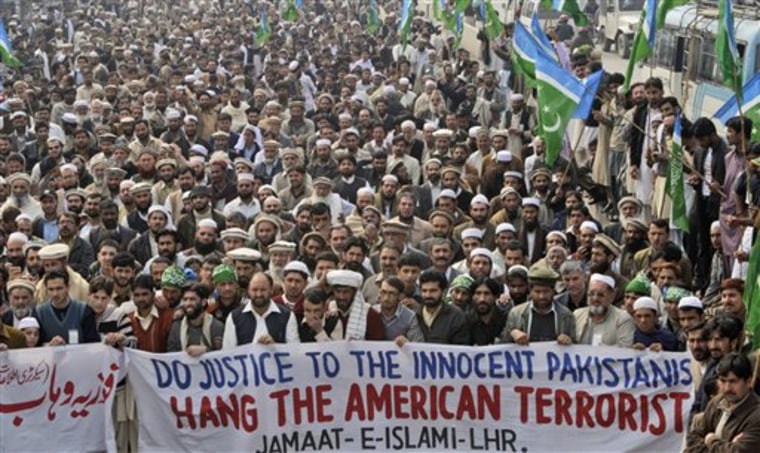U.S. Sen. John Kerry promised the Pakistani people Tuesday that a jailed U.S. embassy worker will be subjected to a U.S. criminal investigation if he is released by the Pakistani government.
Kerry also expressed regret for the deaths of two Pakistani men in an apparent attempt to smooth over relations with the important ally in the war against extremists and al-Qaeda while still insisting that the American needs to be released.
Raymond Allen Davis has been held by Pakistani authorities since he fatally shot two Pakistanis in the eastern city of Lahore on Jan. 27, and his case has become a bitter point of contention between Washington and Islamabad, whose relationship is considered key to ending the war in Afghanistan.
U.S. officials have said Davis shot in self-defense when two armed men on a motorcycle tried to rob him. Pakistani police officials have said they plan to try him for murder, arguing that while the Pakistanis did have a loaded gun, there was no round in the chamber, and saying Davis shot one man as he was trying to flee.
Regardless of guilt, the U.S. says the detention of Davis, a former Special Forces soldier and an embassy worker, is illegal under international agreements covering diplomats.
A chorus of American officials have called for his release on the grounds of diplomatic immunity, including President Barack Obama on Tuesday.
Already, next week's Pakistani meetings in Washington have been cancelled by the U.S. to protest Davis' incarceration. The next step could imperil President Asif Ali Zadari's White House visit next month.
Officials told NBC News that Kerry was sent by the administration to try to remind the Pakistanis that they have a lot more at stake with the U.S. than Davis, who has become a huge issue of Pakistani nationalism, and a major political problem for President Zadari.
In particular: Kerry's visit underscores money — the huge aid bill that guarantees Pakistan 1.5 billion dollars in nonmilitary aid for five years.
Softer approach
Still, in his visit Kerry took a softer approach, saying that international law should not be abandoned, but also pledging that Davis would be fully investigated.
"It is customary in an incident like this for our government to conduct a criminal investigation. That is our law. And I can give you the full assurance of our government today that that will take place," Kerry told reporters in the eastern city of Lahore. "So there is no such thing as a suggestion that something is out of law or that America thinks somehow we're not subject to the law."
Kerry spoke on a last-minute trip to Pakistan to try to heal relations over the case. He emphasized his sorrow over the incident and the deaths of the two men.
"I want to come here today to express our deepest regret for this tragic event and to express the sorrow of the American people for the loss of life that has taken place," he said.
Kerry's visit came as the Pakistani government appeared to be giving an opening for Davis' release through the courts.
Davis was jailed under suspicious circumstances after a shootout which he claimed was self defense. He was armed with a Glock, and other equipment. The Pakistanis have suggested the victims were members of their intelligence service. Another Pakistani — perhaps a bystander — died when an embassy car ran over him, reportedly on the way to rescue Davis from the incident before he was jailed.
Trouble for ZadariA fourth "collateral" victim was the wife of one of the Paksitani men, an 18-year-old woman who reportedly killed herself by drinking rat poison after her husband's death.
The case has been very difficult for President Zadari because it took place in Lahore, a stronghold of the opposition party and has aroused nationalistic and anti-Zadari passions.
A Pakistani federal government official told The Associated Press on Tuesday that after reviewing the matter, most experts in Pakistan's legal and foreign offices believe Davis is immune from prosecution. The official spoke on condition of anonymity because of the subject's sensitivity.
Pakistani government officials had avoided a definitive stand on Davis' legal status in the face of popular anger over the shootout. Thousands have rallied against Davis, demanding he be hanged, while the Taliban have threatened attacks against any Pakistani official involved in freeing the 36-year-old Virginia native.
